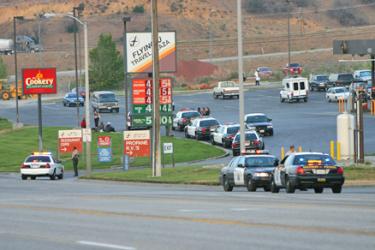
Los Angeles County Sheriff's Department, California Highway Patrol and Kern County Sheriff's Department briefly closed access to Flying J on Friday, May 30.
The Mountain Enterprise
www.mountainenterprise.com
LEBEC, Calif.; Friday, May 30 — The third bomb threat in two weeks was made against Flying J today. According to Los Angeles County Sheriff’s Deputy J. Garcia, the call was received by a Flying J employee at approximately 6 p.m. "The caller," Garcia said, "was male and just said there is a bomb on the premises." The caller did not specify where on the premises the bomb might be.
Employees were allowed to return to the facility and resume work at 7:40 p.m.
Although a Flying J manager told The Mountain Enterprise that a telephoned threat on May 22 (see story) was made by a female, Deputy Garcia said today that all three threats made in the past two weeks were from a male caller.
Questions as to whether reporting such threats might lead to copycat calls are actively discussed among journalists and psychologists.
"Traditionally, news organizations are very careful about reporting bomb threats," said Bob Steele, who teaches ethics at the Poynter Institute for Media Studies in Florida. He was replying to questions from a Bluffton, South Carolina newspaper (The Island Packet) following a bomb threat to a local school. Steele has consulted for The Mountain Enterprise several times on ethical issues in our own community. "We don’t want to prompt copycats who might see the story and seek attention by duplicating the bomb threats or to give any notoriety to the person who was calling in those bomb threats."
In The Island Packet’s report, Dr. Leonard Martin, a University of Georgia professor of psychology, said that the type of person most likely to mimic a bomb threat "is someone who doesn’t have a good sense of who they are."
Martin said, "It may be tough to get noticed by being the star quarterback or the class president or the richest guy in town, but you can sure get in the paper by threatening a bomb or doing something bad. Someone with a poor self concept might seek that kind kind of recognition…."
The media can also help make a community become more vigilant by reporting false threats, according to Charles Bierbauer, the dean of the University of South Carolina’s journalism school.
"If the truth is not reported, rumors and confusion grow and more problems then occur," Steele said. "People start imagining certain scenarios that are not true and those scenarios may be much more harmful than any concern over copycats or the crying wolf that leads to ambivalence."
The Mountain Enterprise believes the community should know what has occurred at a facility frequented by many residents. It is also possible that a reader who knows something about the threats may wish to assist law enforcement.
This is part of the May 30, 2008 online edition of The Mountain Enterprise.
Have an opinion on this matter? We'd like to hear from you.


